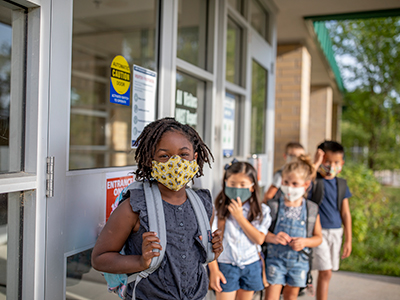Back to school season is a busy time of year and the to-do list is long. Parents and caregivers often make multiple shopping trips for school supplies, backpacks, school shoes and other items. Another important trip is to your child’s health care provider. Every school system in the Washington, D.C. region requires health forms prior to school entry, and it often feels like the list of required forms is growing. Here’s a guide to school health forms to help make sure your children stay safe and healthy at school!
School health forms provide critical information for the school to help your child reach optimal health and achieve their full academic potential. If your child is managing a chronic health condition, there may be additional health forms to help communicate how to support your child in the school setting .
Health Assessment Forms
Most school districts require students to complete a yearly physical examination with their medical provider. With the health assessment form, the medical provider is able to communicate the current health status of the student and identify health concerns that may impact learning and the school experience.
Oral Health Assessment Forms
Although dental caries are largely preventable, they remain the most common chronic disease of children aged 6 to 11 years and adolescents aged 12 to 19 years. Since dental disease can impact school performance and contribute to missed school days, some school districts require an oral health assessment form. This form updates the school on the current health status of the child’s teeth, any present cavities or caries and if there is additional treatment needed in the near future.
Immunization Record Forms
Many school districts require students to present proof of up-to-date immunizations by the first day of school. Immunizations are an important tool to prevent disease, particularly in the school setting where large numbers of children are in contact with each other. Your child’s medical provider can review the age-appropriate immunization schedule with you, and address any concerns you may have about immunization. Visit the Centers for Disease Control and Prevention for up-to-date information on immunization schedules.
Medication and Medical Treatment Forms
The medication and medical treatment forms are important to communicate the details of your child’s medication and medical treatment plan to be administered at their school. These forms provide critical information about diagnosis, medication details and any possible side effects of the treatment or medication. The most common examples of these types of forms are the Asthma Action Plan and the Anaphylaxis Action Plan. Since asthma and anaphylaxis are life-threatening conditions, it is very important that your child’s school has these forms so they know what to do if your child becomes ill.
Dietary Accommodation Form
Many students have medical conditions that are impacted by diet, such as celiac disease or diabetes. School districts may have a Dietary Accommodation Form, which allows the school to be informed of the student’s medical condition and to prepare appropriate meals for that student. With these forms, it is important to get them in to the school in advance of the school year, so that the cafeteria staff has time to plan appropriate meals and menus for various dietary needs.
Diabetes Medical Management Plan
Some students manage their diabetes independently. However, younger or newly diagnosed students may need help with all aspects of their diabetes care. For this reason, doctor’s orders for school care need to be specific for each student. Your child’s school district may have a form dedicated to diabetes management, or may use a standard medication form. The American Diabetes Association has partnered with the National Diabetes Education Program to help create Diabetes Medical Management Plan that can be customized for every student to give to their child’s school to implement and carry out their provider’s recommendations.
School health forms are an important part of back-to-school preparation and planning. They serve as an important tool to communicate with school staff about your child’s needs, and help to ensure that your child has a safe and healthy school experience.
 https://riseandshine.childrensnational.org/wp-content/uploads/2025/07/girl-at-doctors-feature.jpg
300
400
Rise and Shine
https://riseandshine.childrensnational.org/wp-content/uploads/2017/11/childrens_riseandshine_logo.jpg
Rise and Shine2025-07-10 17:44:132025-07-10 17:44:13Back-to-school physicals: A message from your pediatrician
https://riseandshine.childrensnational.org/wp-content/uploads/2025/07/girl-at-doctors-feature.jpg
300
400
Rise and Shine
https://riseandshine.childrensnational.org/wp-content/uploads/2017/11/childrens_riseandshine_logo.jpg
Rise and Shine2025-07-10 17:44:132025-07-10 17:44:13Back-to-school physicals: A message from your pediatrician




















Leave a Comment
Want to join the discussion?Feel free to contribute!